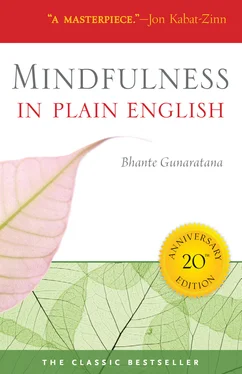Henepola Gunaratana - Mindfulness in Plain English
Здесь есть возможность читать онлайн «Henepola Gunaratana - Mindfulness in Plain English» весь текст электронной книги совершенно бесплатно (целиком полную версию без сокращений). В некоторых случаях можно слушать аудио, скачать через торрент в формате fb2 и присутствует краткое содержание. Жанр: Самосовершенствование, на английском языке. Описание произведения, (предисловие) а так же отзывы посетителей доступны на портале библиотеки ЛибКат.
- Название:Mindfulness in Plain English
- Автор:
- Жанр:
- Год:неизвестен
- ISBN:нет данных
- Рейтинг книги:3 / 5. Голосов: 1
-
Избранное:Добавить в избранное
- Отзывы:
-
Ваша оценка:
- 60
- 1
- 2
- 3
- 4
- 5
Mindfulness in Plain English: краткое содержание, описание и аннотация
Предлагаем к чтению аннотацию, описание, краткое содержание или предисловие (зависит от того, что написал сам автор книги «Mindfulness in Plain English»). Если вы не нашли необходимую информацию о книге — напишите в комментариях, мы постараемся отыскать её.
Mindfulness in Plain English — читать онлайн бесплатно полную книгу (весь текст) целиком
Ниже представлен текст книги, разбитый по страницам. Система сохранения места последней прочитанной страницы, позволяет с удобством читать онлайн бесплатно книгу «Mindfulness in Plain English», без необходимости каждый раз заново искать на чём Вы остановились. Поставьте закладку, и сможете в любой момент перейти на страницу, на которой закончили чтение.
Интервал:
Закладка:
The concept of wasted time does not exist for a serious meditator. Little dead spaces during your day can be turned to profit. Every spare moment can be used for meditation. Sitting anxiously in the dentist’s office, meditate on your anxiety. Feeling irritated while standing in a line at the bank, meditate on irritation. Bored, twiddling you thumbs at the bus stop, meditate on boredom. Try to stay alert and aware throughout the day. Be mindful of exactly what is taking place right now, even if it is tedious drudgery. Take advantage of moments when you are alone. Take advantage of activities that are largely mechanical. Use every spare second to be mindful. Use all the moments you can.
You should try to maintain mindfulness of every activity and perception through the day, starting with the first perception when you awake, and ending with the last thought before you fall asleep. This is an incredibly tall goal to shoot for. Don’t expect to be able to achieve this work soon. Just take it slowly and let you abilities grow over time. The most feasible way to go about the task is to divide your day up into chunks. Dedicate a certain interval to mindfulness of posture, then extend this mindfulness to other simple activities: eating, washing, dressing, and so forth. Some time during the day, you can set aside 15 minutes or so to practice the observation of specific types of mental states: pleasant, unpleasant, and neutral feelings, for instance; or the hindrances, or thoughts. The specific routine is up to you. The idea is to get practice at spotting the various items, and to preserve your state of mindfulness as fully as you can throughout the day.
Try to achieve a daily routine in which there is as little difference as possible between seated meditation and the rest of your experience. Let the one slide naturally into the other. Your body is almost never still. There is always motion to observe. At the very least, there is breathing. Your mind never stops chattering, except in the very deepest states of concentration. There is always something coming up to observe. If you seriously apply your meditation, you will never be at a loss for something worthy of your attention.
Your practice must be made to apply to your everyday living situation. That is your laboratory. It provides the trials and challenges you need to make your practice deep and genuine. It’s the fire that purifies your practice of deception and error, the acid test that shows you when you are getting somewhere and when you are fooling yourself. If your meditation isn’t helping you to cope with everyday conflicts and struggles, then it is shallow. If your day-to-day emotional reactions are not becoming clearer and easier to manage, then you are wasting your time. And you never know how you are doing until you actually make that test.
The practice of mindfulness is supposed to be a universal practice. You don’t do it sometimes and drop it the rest of the time. You do it all the time. Meditation that is successful only when you are withdrawn in some soundproof ivory tower is still undeveloped. Insight meditation is the practice of moment-to-moment mindfulness. The meditator learns to pay bare attention to the birth, growth, and decay of all the phenomena of the mind. He turns from none of it, and he lets none of it escape. Thoughts and emotions, activities and desires, the whole show. He watches it all and he watches it continuously. It matters not whether it is lovely or horrid, beautiful or shameful. He sees the way it is and the way it changes. No aspect of experience is excluded or avoided. It is a very thoroughgoing procedure.
If you are moving through your daily activities and you find yourself in a state of boredom, then meditate on your boredom. Find out how it feels, how it works, and what it is composed of. If you are angry, meditate on the anger. Explore the mechanics of anger. Don’t run from it. If you find yourself sitting in the grip of a dark depression, meditate on the depression. Investigate depression in a detached and inquiring way. Don’t flee from it blindly. Explore the maze and chart its pathways. That way you will be better able to cope with the next depression that comes along.
Meditating your way through the ups and downs of daily life is the whole point of Vipassana. This kind of practice is extremely rigorous and demanding, but it engenders a state of mental flexibility that is beyond comparison. A meditator keeps his mind open every second. He is constantly investigating life, inspecting his own experience, viewing existence in a detached and inquisitive way. Thus he is constantly open to truth in any form, from any source, and at any time. This is the state of mind you need for Liberation.
It is said that one may attain enlightenment at any moment if the mind is kept in a state of meditative readiness. The tiniest, most ordinary perception can be the stimulus: a view of the moon, the cry of a bird, the sound of the wind in the trees. It’s not so important what is perceived as the way in which you attend to that perception. The state of open readiness is essential. It could happen to you right now if you are ready. The tactile sensation of this book in your fingers could be the cue. The sound of these words in your head might be enough. You could attain enlightenment right now, if you are ready.
Chapter 16
What’s In It For You
You can expect certain benefits from your meditation. The initial ones are practical, prosaic things; the later stages are profoundly transcendent. They run together from the simple to the sublime. We will set forth some of them here. Your own experience is all that counts.
Those things that we called hindrances or defilements are more than just unpleasant mental habits. They are the primary manifestations of the ego process itself. The ego sense itself is essentially a feeling of separation—a perception of distance between that which we call me, and that which we call other. This perception is held in place only if it is constantly exercised, and the hindrances constitute that exercise.
Greed and lust are attempts to get ‘some of that’ for me; hatred and aversion are attempts to place greater distance between ‘me and that’. All the defilements depend upon the perception of a barrier between self and other, and all of them foster this perception every time they are exercised. Mindfulness perceives things deeply and with great clarity. It brings our attention to the root of the defilements and lays bare their mechanism. It sees their fruits and their effects upon us. It cannot be fooled. Once you have clearly seen what greed really is and what it really does to you and to others, you just naturally cease to engage in it. When a child burns his hand on a hot oven, you don’t have to tell him to pull it back; he does it naturally, without conscious thought and without decision. There is a reflex action built into the nervous system for just that purpose, and it works faster than thought. By the time the child perceives the sensation of heat and begins to cry, the hand has already been jerked back from the source of pain. Mindfulness works in very much the same way: it is wordless, spontaneous and utterly efficient. Clear mindfulness inhibits the growth of hindrances; continuous mindfulness extinguishes them. Thus, as genuine mindfulness is built up, the walls of the ego itself are broken down, craving diminishes, defensiveness and rigidity lessen, you become more open, accepting and flexible. You learn to share your loving-kindness.
Traditionally, Buddhists are reluctant to talk about the ultimate nature of human beings. But those who are willing to make descriptive statements at all usually say that our ultimate essence or Buddha nature is pure, holy and inherently good. The only reason that human beings appear otherwise is that their experience of that ultimate essence has been hindered; it has been blocked like water behind a dam. The hindrances are the bricks of which the dam is built. As mindfulness dissolves the bricks, holes are punched in the dam and compassion and sympathetic joy come flooding forward. As meditative mindfulness develops, your whole experience of life changes. Your experience of being alive, the very sensation of being conscious, becomes lucid and precise, no longer just an unnoticed background for your preoccupations. It becomes a thing consistently perceived.
Читать дальшеИнтервал:
Закладка:
Похожие книги на «Mindfulness in Plain English»
Представляем Вашему вниманию похожие книги на «Mindfulness in Plain English» списком для выбора. Мы отобрали схожую по названию и смыслу литературу в надежде предоставить читателям больше вариантов отыскать новые, интересные, ещё непрочитанные произведения.
Обсуждение, отзывы о книге «Mindfulness in Plain English» и просто собственные мнения читателей. Оставьте ваши комментарии, напишите, что Вы думаете о произведении, его смысле или главных героях. Укажите что конкретно понравилось, а что нет, и почему Вы так считаете.












